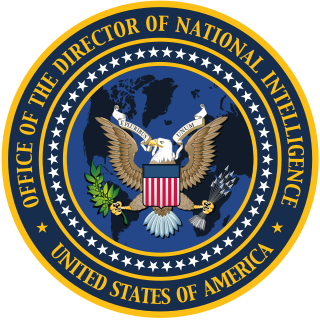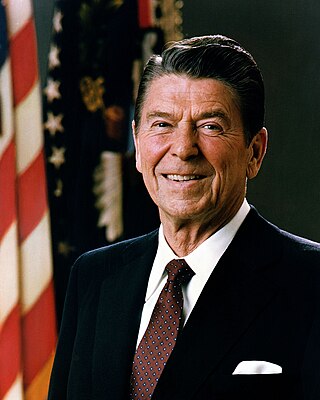
The Federal Bureau of Investigation (FBI) is the domestic intelligence and security service of the United States and its principal federal law enforcement agency. An agency of the United States Department of Justice, the FBI is a member of the U.S. Intelligence Community and reports to both the attorney general and the director of national intelligence. A leading American counterterrorism, counterintelligence, and criminal investigative organization, the FBI has jurisdiction over violations of more than 200 categories of federal crimes.

The USA PATRIOT Act was a landmark Act of the United States Congress, signed into law by President George W. Bush. The formal name of the statute is the Uniting and Strengthening America by Providing Appropriate Tools Required to Intercept and Obstruct Terrorism Act of 2001, and the commonly used short name is a contrived acronym that is embedded in the name set forth in the statute.

The director of national intelligence (DNI) is a senior cabinet-level United States government official, required by the Intelligence Reform and Terrorism Prevention Act of 2004 to serve as executive head of the United States Intelligence Community (IC) and to direct and oversee the National Intelligence Program (NIP). All 18 IC agencies, including the Central Intelligence Agency (CIA), the Defense Intelligence Agency (DIA) and the National Security Agency (NSA), report directly to the DNI.

J. Michael "Mike" McConnell is a former vice admiral in the United States Navy. He served as Director of the National Security Agency from 1992 to 1996 and as the United States Director of National Intelligence from February 2007 to January 2009 during the Bush administration and first week of the Obama administration. As of January 2024, he is the Vice Chairman at Booz Allen Hamilton.

The United States Intelligence Community (IC) is a group of separate U.S. federal government intelligence agencies and subordinate organizations that work both separately and collectively to conduct intelligence activities which support the foreign policy and national security interests of the United States. Member organizations of the IC include intelligence agencies, military intelligence, and civilian intelligence and analysis offices within federal executive departments.

The Foreign Intelligence Surveillance Act of 1978 is a United States federal law that establishes procedures for the surveillance and collection of foreign intelligence on domestic soil.

Intelink is a group of secure intranets used by the United States Intelligence Community. The first Intelink network was established in 1994 to take advantage of Internet technologies and services to promote intelligence dissemination and business workflow. Since then it has become an essential capability for the US intelligence community and its partners to share information, collaborate across agencies, and conduct business. Intelink refers to the web environment on protected top secret, secret, and unclassified networks. One of the key features of Intelink is Intellipedia, an online system for collaborative data sharing based on MediaWiki. Intelink uses WordPress as the basis of its blogging service.

Executive Order 12333, signed on December 4, 1981 by U.S. President Ronald Reagan, was an executive order intended to extend powers and responsibilities of U.S. intelligence agencies and direct the leaders of U.S. federal agencies to co-operate fully with CIA requests for information. This executive order was titled United States Intelligence Activities.

NSA warrantless surveillance — also commonly referred to as "warrantless-wiretapping" or "-wiretaps" — was the surveillance of persons within the United States, including U.S. citizens, during the collection of notionally foreign intelligence by the National Security Agency (NSA) as part of the Terrorist Surveillance Program. In late 2001, the NSA was authorized to monitor, without obtaining a FISA warrant, phone calls, Internet activities, text messages and other forms of communication involving any party believed by the NSA to be outside the U.S., even if the other end of the communication lies within the U.S.
The United States government classification system is established under Executive Order 13526, the latest in a long series of executive orders on the topic of classified information beginning in 1951. Issued by President Barack Obama in 2009, Executive Order 13526 replaced earlier executive orders on the topic and modified the regulations codified to 32 C.F.R. 2001. It lays out the system of classification, declassification, and handling of national security information generated by the U.S. government and its employees and contractors, as well as information received from other governments.

The following is a section summary of the USA PATRIOT Act, Title II. The USA PATRIOT Act was passed by the United States Congress in 2001 as a response to the September 11, 2001 attacks. Title II: Enhanced Surveillance Procedures gave increased powers of surveillance to various government agencies and bodies. This title has 25 sections, with one of the sections containing a sunset clause which sets an expiration date, of 31 December 2005, for most of the title's provisions. On 22 December 2005, the sunset clause expiration date was extended to 3 February 2006.
The Privacy and Civil Liberties Oversight Board (PCLOB) is an independent agency within the executive branch of the United States government, established by Congress in 2004 to advise the President and other senior executive branch officials to ensure that concerns concerning privacy and civil liberties in the United States are appropriately considered in the development and implementation of all laws, regulations, and executive branch policies related to terrorism.
The Open Source Enterprise (OSE) is a United States Government organization dedicated to open-source intelligence. Initially part of the Office of the Director of National Intelligence, it is now part of the Directorate of Digital Innovation at the Central Intelligence Agency (CIA). Former iterations of the organization were the Open Source Center (OSC) and the Foreign Broadcast Information Service (FBIS).

The United States government's Information Sharing and Customer Outreach office or ISCO was one of five directorates within the office of the chief information officer (CIO) under the Office of the Director of National Intelligence (ODNI). ISCO changed its name and function to Information Technology Policy, Plans, and Requirements (ITPR) in July 2007. Established by at least February 2006, ISCO is led by the Deputy Associate Director of National Intelligence for Information Sharing and Customer Outreach, which is currently Mr. Richard A. Russell. ISCO's information sharing and customer outreach responsibilities extend beyond the United States Intelligence Community and cross the entire U.S. government.

The history of the USA PATRIOT Act involved many parties who opposed and supported the Patriot Act, which was proposed, enacted and signed into law 45 days after the September 11 terrorist attacks in 2001. The legislation, though approved by large majorities in the U.S. Senate and House of Representative, was controversial, and parts of the law were invalidated or modified by successful legal challenges over constitutional infringements to civil liberties. The Act had several sunset provisions, most reauthorized by the USA PATRIOT Improvement and Reauthorization Act of 2005 and the USA PATRIOT Act Additional Reauthorizing Amendments Act. Both reauthorizations incorporated amendments to the original USA PATRIOT Act, and other federal laws.
Executive Order 13356 is a United States Presidential Executive Order signed on August 27, 2004, by President George W. Bush. Its goal was "Strengthening the Sharing of Terrorism Information To Protect Americans". It was supplemented by and partially superseded Executive Order 13388.
The Intelligence Community Whistleblower Protection Act of 1998, amending the Central Intelligence Agency Act of 1949 and the Inspector General Act of 1978, sets forth a procedure for employees and contractors of specified federal intelligence agencies to report complaints or information to the United States Congress about serious problems involving intelligence activities.

Executive Order 11905 is a United States Presidential Executive Order signed on February 18, 1976, by President Gerald R. Ford in an effort to reform the United States Intelligence Community, improve oversight on foreign intelligence activities, and ban political assassination. Much of this EO would be changed or strengthened by Jimmy Carter's Executive Order 12036 in 1978.
The Information Sharing Environment (ISE) was established by the United States Intelligence Reform and Terrorism Prevention Act of 2004. Under Section 1016 of IRTPA, the Program Manager for the Information Sharing Environment (PM-ISE) was granted government wide authority to plan for, oversee the implementation of, and manage the ISE.
The United States Presidential Policy Directive 19, signed by President Barack Obama, is designed to ensure that employees who serve in the Intelligence Community or have access to classified information can effectively report waste, fraud, and abuse, while protecting classified information. It is the executive order establishing standards for all Federal agencies with employees covered by the Directive, including those under Defense Intelligence Community Whistleblower Protection and the U.S. Department of Defense Whistleblower Program. It also prohibits retaliation against these employees for their reports. PPD-19 accordingly establishes a system of Intelligence community whistleblowing and source protection under the Office, Director of National Intelligence and supervised by the Inspector General of the Intelligence Community.









